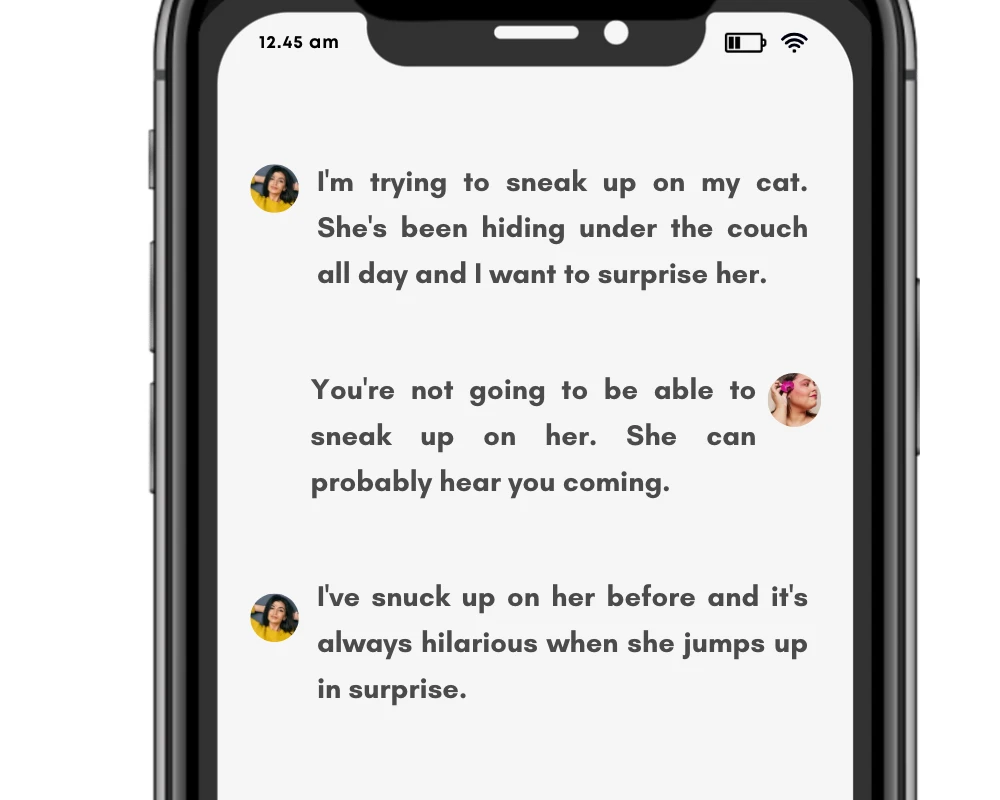
What's the past tense of "sneak"?
The simple past tense of sneak originally was sneaked. Now, snuck is commonly accepted as both the past tense and past participle forms of the present tense, sneak.
Some still consider snuck a colloquialism—in other words, snuck is conversational or nonstandard. This does not make snuck incorrect—it just means that some are against its use. If you need a resource to arbitrate the debate on the past tense of 'sneak', you can refer to this blog.
Definition of sneak
To sneak, as described by Collins Dictionary, describes "trying to avoid being seen or heard". To sneak off somewhere means to leave in a way that doesn't attract attention. 'Sneaking something' means taking, bringing, or doing something in a discreet way.
- The past tense of sneak is sneaked or snuck.
- The past participle of sneak is sneaked or snuck.
Verb forms of 'sneak'
Remember to always pair participles with auxiliaries to create perfect and continuous tenses! Use ‘have’, ‘has’, or ‘had’ to form perfect tenses, and a form of ‘to be’ for continuous.
Is sneak a regular or irregular verb?
Sneak is an irregular verb— its past conjugations are sneaked or snuck in all cases.
When to use sneaked vs snuck
I sneaked out of the meeting early.
She snuck a peek at the answers during the test.
The verb sneak uses the same forms for both simple past tense and past participle. When used as a participle (shown in the second sentence), it requires an auxiliary verb like have, has, or had. The simple past doesn't use a helper verb since it's a complete tense, so sneaked or snuck can stand alone in sentences, whereas participles require an auxiliary verb.
Similar irregular verbs
These verbs follow similar irregular patterns to sneak, with both regular and irregular forms or irregular past tense and past participle forms.
Sentence examples: sneak, sneaked/snuck, sneaked/snuck
• I can hear you sneaking around!
• Let's sneak the tickets early.
• He sneaks through the hallway without being noticed.
• I'd sneaked up and frightened them.
• She sneaked her way to the front row.
• They sneaked past the security guard.
• I had snuck out without getting caught.
• He snuck past me without a word.
• We have snuck into the movie theater before.
Synonyms & nearby words
Synonyms for sneak
Nearby phrases
Quotes from literature and the media
He wanted to sneak her into his room.
—R. Jaffe, Class Reunion
There was some suspicion that a couple of guests had snuck friends in.
I snuck in there and grabbed it.
—R. Chandler, Farewell, My Lovely
I have..sneaked along the walks, with that astonished and diffident air.
—A. Pope, Correspondence 25 September (1956) vol. I. 255
They..sneaked from my door with every mark of..servile cowardice.
—T. Hook, Sayings & Doings 2nd Series vol. II. 51
Origin of the word sneak
From etymology online on sneak (v.):
1550s (implied in sneakish), perhaps from some dialectal survival of Middle English sniken "to creep, crawl" (c. 1200), related to Old English snican "to sneak along, creep, crawl," from Proto-Germanic *sneikanan, which is related to the root of snake (n.).
Practice: Forms of "Sneak"
He ______ into the kitchen late at night for a snack.
In informal American English, it is common to hear that someone ______ out of the house.
She tried to ______ a peek at the answers during the test.
They had ______ past the guard without being seen.
The cat ______ up on the unsuspecting mouse.
FAQs
Is "snuck" or "sneaked" correct?
What tense is "I snuck"?
Is "sneak" a regular verb?
How is "snuck" used in sentences?
Sources
- "Colloquialism, N." Oxford English Dictionary, Oxford UP, July 2023, https://doi.org/10.1093/OED/9374730616.
- Jaffe, R. Class Reunion: A Novel. USA TODAY, 1979.
- McCarron, Kevin. "Chandler, Raymond Thornton (1888–1959), writer." Oxford Dictionary of National Biography. September 01, 2017. Oxford University Press. Date of access 2 Sep. 2025.
Advertisement








.webp&w=3840&q=75&dpl=dpl_13tcGbrn5BXPQFsQmuQWqib9Y3DN)